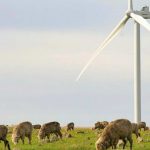Feed aggregator
The Guardian view on German politics: is green the new normal? | Editorial
Global heating is now setting the parameters of political debate
These are heady days to be a German Green. Last month, Die Grünen chose 40-year-old Annalena Baerbock as their candidate for chancellor in September’s federal election. Since then there has been a huge influx of new members excited by the prospect of what is shaping up to be a generational shift in the country’s politics. According to the latest polls, the party is either fighting for first place with or is ahead of the Christian Democratic Union, which is mired in Covid-related difficulties, including a corruption scandal and dissatisfaction at the slow rollout of the vaccination programme.
There have been green awakenings in the past which proved ephemeral. In the wake of the Fukushima nuclear disaster 10 years ago, the party enjoyed a historic surge in support, only to slump disappointingly at the 2013 election. This time feels significantly different. The Greens already form part of coalition governments in 11 of Germany’s 16 states. Their poll ratings have comfortably eclipsed those of the centre-left Social Democrats over the past 12 months, and a pragmatic leadership has been careful to court the political mainstream on foreign policy issues such as commitment to Nato. One striking survey for a German business magazine found that more company executives preferred the idea of Ms Baerbock as the next chancellor to the 60-year-old Armin Laschet, the somewhat lacklustre CDU candidate.
Continue reading...Soaring EU carbon price stifling low-carbon investment, creating “live and let die” business environment
‘It’s like a rotting carcass of its former self’: funeral for an Oregon glacier
Worried researchers hold ceremony for Clark glacier to illustrate how climate crisis is eroding icepacks
The funeral was a suitably solemn affair. The small casket was placed on a table covered in a black drape, a maudlin yet defiant speech quoted a Dylan Thomas poem, a moment’s silence was held.
Inside the casket, however, was not a body, but a vial of meltwater from Clark glacier in Oregon, once an imposing body of ice but now a shrivelled remnant.
Continue reading...Nasa astronauts splash-land on Earth in SpaceX capsule after ISS mission
Glacial lakes threaten millions with flooding as planet heats up
More than 12,000 deaths have already been attributed to glacial lake outburst floods worldwide
An increasing number of people are being threatened by flooding caused by glacial lakes bursting, scientists have warned.
As the planet warms and glaciers recede, meltwater accumulates and forms lakes, often as a result of ice or moraine acting as a dam. Since 1990, the volume, area and number of these glacial lakes has increased by 50% globally. When these lakes become too full there is a risk that they may breach or overflow, releasing huge volumes of water and causing catastrophic flooding.
Continue reading...Redirect harmful subsidies to benefit the planet, UN urges governments
Head of the Kunming biodiversity summit asks nations to review destructive support for fishing, agriculture and other industries
Billions of pounds of environmentally harmful government subsidies must be redirected to benefit nature, the United Nation’s biodiversity chief has said, before the restart of negotiations on an international agreement to set new targets for protecting nature.
Elizabeth Maruma Mrema, the executive secretary of the UN Convention on Biological Diversity, said states must review and adapt support for agriculture, fishing and other industries that are driving the destruction of the natural world, and adopt policies that meet human needs while also conserving the health of the planet.
Continue reading...Victoria ramps up climate target, but stays at lower end of recommended range
 Victoria increases 2030 emissions reduction target to up to 50 pct. The reaction shows the deep gulf between environmentalists, investors and employers.
Victoria increases 2030 emissions reduction target to up to 50 pct. The reaction shows the deep gulf between environmentalists, investors and employers.
The post Victoria ramps up climate target, but stays at lower end of recommended range appeared first on RenewEconomy.
Then and now: When silence descended over Victoria Falls
‘I’m not selling’: what happens when an Australian town is consumed by a US coalminer?
Col Faulkner, 68, owns the only house in Wollar that hasn’t been bought up by US-based miner Peabody
Bev Smiles usually turns up at least an hour before the start of any functions at Wollar’s community hall – a spot for many a dance and committee meeting over the years.
“We have to get in early with leaf blowers to get an inch of dust off the floor – every surface in the hall is black,” Smiles says. “That’s what people’s kitchens are like.”
Continue reading...Climate activist arrested after gluing himself to Westminster Bridge
Hundreds took part in Extinction Rebellion ‘rebellion of one’ acts on Saturday to protest lack of action on climate emergency
A man has been arrested after gluing himself to Westminster Bridge in London in protest at a lack of government action two years after parliament declared a climate emergency.
Related: ‘I’ll continue to fight’: the prosecuted Extinction Rebellion protesters
Continue reading...Dare we hope? Here’s my cautious case for climate optimism | Rebecca Solnit
The Green New Deal, formerly seen as radical, is now in mainstream debate. And renewable energy becomes more efficient every day
That we are living in science fiction was brought home to me last week when I put down Kim Stanley Robinson’s superb climate-futures novel The Ministry for the Future and picked up Bill McKibben’s New Yorker letter on climate, warning of the melting of the Thwaites Glacier, “already known as the ‘doomsday glacier’ because its collapse could raise global sea levels by as much as three feet”. Where we are now would have seemed like science fiction itself 20 years ago; where we need to be will take us deeper into that territory.
Three things matter for climate chaos and our response to it – the science reporting on current and potential conditions, the technology offering solutions, and the organizing which is shifting perspectives and policy. Each is advancing rapidly. The science mostly gives us terrifying news of more melting, more storms, more droughts, more fires, more famines. But the technological solutions and the success of the organizing to address this largest of all crises have likewise grown by leaps and bounds. For example, ideas put forth in the Green New Deal in 2019, seen as radical at the time, are now the kind of stuff President Biden routinely proposes in his infrastructure and jobs plans.
Continue reading...Victoria offers $3,000 subsidy for electric vehicles, sets 50pct target by 2030
 Victoria to offer $3,000 subsidy for electric vehicles from Sunday, in response to criticism over its EV road tax.
Victoria to offer $3,000 subsidy for electric vehicles from Sunday, in response to criticism over its EV road tax.
The post Victoria offers $3,000 subsidy for electric vehicles, sets 50pct target by 2030 appeared first on RenewEconomy.
Streams and lakes have rights, a US county decided. Now they’re suing Florida
A novel lawsuit is taking advantage of a local ‘rights of nature’ measure passed in November in effort to protect wetlands
A network of streams, lakes and marshes in Florida is suing a developer and the state to try to stop a housing development from destroying them.
The novel lawsuit was filed on Monday in Orange county on behalf of the waterways under a “rights of nature” law passed in November. It is the largest US municipality to adopt such a law to date.
Continue reading...GDT Nature Photographer of the Year 2021
A look at the winning entries in the German Society for Nature Photography’s member competition
How glaciers are shrinking at an ever faster pace
Analysis: glaciers are on average 8 metres thinner and many have vanished completely because of global heating
The rate at which glaciers have been thinning has accelerated in recent years. Since the 1960s, when the effects of global heating started to become clear, the pace of melting has grown faster and faster.
In the 1960s, glaciers were losing just a few centimetres of thickness a year, and in some years even adding mass. However, by the 1990s, it was normal to see 40-60cm a year of average ice loss. The only exception was in the year after the enormous volcanic eruption of Mount Pinatubo in the Philippines in 1991, which had a dramatic cooling effect on the Earth, resulting in a slight gain in mass.
Continue reading...US beekeepers sue over imports of Asian fake honey
Commercial beekeepers in the US say counterfeit honey from Asia is forcing down prices and pushing them to financial collapse
Imports of cheap, fake honey from Asia are pushing American beekeepers to financial collapse, according to a lawsuit.
Thousands of commercial beekeepers in the US have taken legal action against the country’s largest honey importers and packers for allegedly flooding the market with hundreds of thousands of tonnes of counterfeit honey.
Continue reading...


